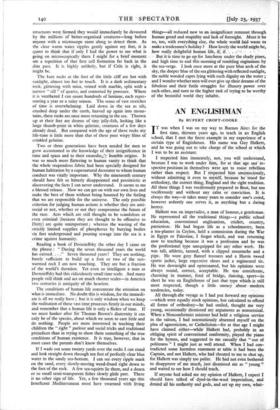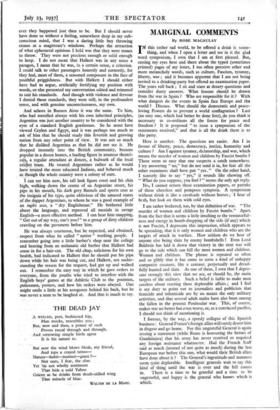AN ENGLISHMAN
By RUPERT CROFT-COOKE
IT was when I was on my way to Buenos Aires for the first time, thirteen years ago, to teach in an English school, that I met the finest example in my experience of a certain type of Englishman. His name was Guy Halkett, and he was going out to take charge of the school at which I was to be an assistant.
I respected him immensely, not, you will understand, because I was to work under him, for at that age our re- spective positions in themselves were apt to rouse rebellion rather than respect. But I respected him unconsciously, without admitting it even to myself, because he stood for orthodoxy, the correct thing, England and the right tradition. All these things I was vociferously prepared to flout, but too vociferously and without any calm or conviction. It. is always the way—it takes many years to consider one's creed, however ardently one serves it, as anything but a daring heresy.
Halkett was an imperialist, a man of honour, a gentleman. He represented all the traditional things—a public school education, conventional anglicanism, cricket, country, patriotism. He had begun life as a schoolmaster, been a tea-planter in Ceylon, held a commission during the War in Egypt or Palestine, I forget which, and was returning now to teaching because it was a profession and he was the professional type unequipped for any other work. He was tall, athletic, tanned, with a clipped moustache and a pipe. He wore grey flannel trousers and a Harris tweed sports jacket, large expensive shoes and a regimental tie. He was downright and opinionated, but his opinions were always sound, correct, acceptable. He was considerate, charming in manner, fond of bridge, dancing, sport—in short he was an Englishman of just that type which is still most respected, though a little uneasy about modern tendencies, today.
All through,the voyage as I had put forward my opinions —which were equally stock opinions, but calculated to offend all forms of orthodoxy—he had smiled, thought me very young, occasionally dismissed my arguments as nonsensical. When a Nonconformist minister had held a religious service in the saloon, I had ostentatiously absented myself on the plea of agnosticism, or Catholicism—for at that age I might have claimed either—while Halkett had, probably in an obliging spirit of conventional conformity, played the piano for the hymns, and suggested to me casually that " out of politeness " I might just as well attend. When I had con- tradicted some harmless statement at table it had been the Captain, and not Halkett, who had shouted to me to shut up, for Halkett was simply too polite. He had not even bothered to disapprove of me much, just dismissed me as " young '? and waited to see how I should teach.
If anyone had asked me my opinion of Halkett, I expect I should have talked of dyed-in-the-wool imperialism, and denied all his authority and gods, and set up my own, what- ever they happened just then to be. But I should never have done so without a feeling, somewhere deep in my sub- conscious mind, that I was a daring little boy throwing stones at a magistrate's -windows. Perhaps the attraction of what ephemeral opinions I held was that they were stones to throw. They were not precious enough or solid enough to keep. I do not mean that Halkett was in any sense a paragon, I mean that he was, in a certain sense, a criterion. I could talk to other passengers honestly and earnestly, for they had, most of them, a seasoned composure in the face of youthful priggishness. But with Halkett I should either have had to argue, artificially fortifying my position with words, or else presented my conversation edited and trimmed to suit his standards. And though with violence and fervour I denied those standards, they were still, in the profoundest sense, and with genuine unconsciousness, my own.
And ashore in Buenos Aires it was the same. To him, who had travelled always with his own inherited principles, Argentina was just another country to be considered with the eyes of a standard English gentleman. So he must have viewed Ceylon and Egypt, and it was perhaps too much to ask of him that he should study this feverish and growing nation from any other point of view. It was not so much that he disliked Argentina as that he did not see it. He dropped instantly into the British community, became popular in a dozen homes, a leading figure in amateur theatri- cals a regular attendant at dances, a bulwark of the local criCiet team. He treated Argentines rather as he would have treated the more educated Indians, and behaved much as though the whole country were a colony of ours.
I can see him now, his tall lank figure erect and his chin high, walking down the centre of an Argentine street, his pipe in his mouth, his dark grey flannels and sports coat as the insignia of his type, quite oblivious of the amused stares of the dapper Argentines, to whom he was a good example of an ingles seco, a " dry Englishman." He bothered little about_ the language, and reproved all menials in savage English—a most effective method. I can hear him snapping, " Get out of my way, can't you!" to a group of dirty children crawling on the pavement before him.
He was always courteous, but he expected, and obtained, respect from what he called' " native " working people. I remember going into a little barber's shop near the college and hearing from an asthmatic old barber that Halkett had come in for a hair-cut. The old chap, solicitous for his own health, had indicated to Halkett that he should put his pipe down while his hair was being cut, and Halkett, not under- standing the reason for the request, had got up and walked out. I remember the easy way in which he gave orders to everyone, from the youths who tried to interfere with the English boys' games at the Athletic Club to the postmen, policemen, porters, and how his orders were obeyed. One might smile a little at his arrogance behind his back, but he was never a man to be laughed at. And that is much to say.































































 Previous page
Previous page